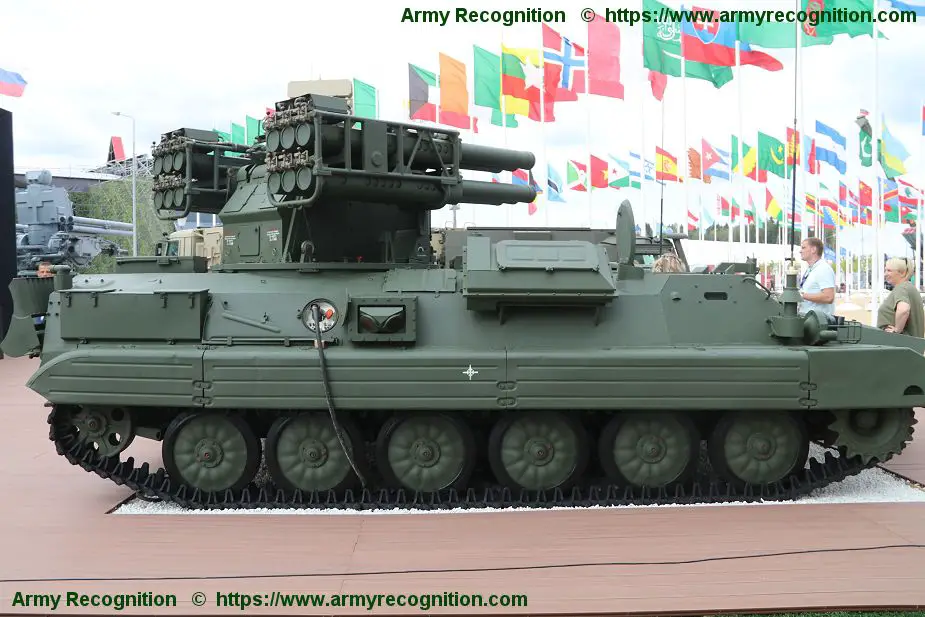Breaking news
IDEX 2021: Almaz-Antey unveils wheeled Sosna air defense system.
Russia’s Nudelman Design Bureau (a subsidiary of the Almaz-Antey Corporation) has designed the wheeled Sosna (Pinetree) surface-to-air missile (SAM) system. A scale model of this new air defense is unveiled at IDEX 2021.

Scale model of the new Sosna air defense system on 8x8 chassis coming from a BTR-70 APC (Picture source: Army Recognition)
The wheeled Sosna is intended to be based on the chassis of the BTR-82A armored personnel carrier (APC) but the scale model displayed at IDEX 2021 shows a BTR-70. According to the Nudelman Design Bureau, the system is designed to protect military and industrial assets against a wide range of air threats, including fixed- and rotary-wing aircraft, unmanned aerial vehicles (UAVs), and cruise missiles. The weapon also engages lightly armored platforms, if necessary. The Sosna can operate under harsh weather conditions and in an electronically contested environment, the manufacturer claims.
The new SAM system is armed with 12 ready-use Sosna-R containerized missiles, which engage aerial targets flying at a top speed of 500 m/s. The air defense weapon featuring an automatic target acquisition and tracking system has a target engagement range of up to 10 km and a target engagement altitude of up to 5 km. The weapon’s launcher has an elevation angle of up to +82° and an azimuth angle of 360°. The SAMs are mounted in two six-cell banks on each side of the launching unit. The Sosna functions in both automatic and semi-automatic modes.
The SAM system uses both its integral optical-electronic suite and external target designators to receive target data. When the weapon is integrated with an external target designator (the Barnaul command and control (C2) system, the PU12M C2 unit, and other systems of the type), the Sosna unit comprises a mobile C2 post and up to six combat vehicles. If the system operates in autonomous mode, the Sosna unit comprises six combat platforms, with one vehicle designating targets and distributing target data.
The Sosna has been fitted with an optical-electronic control subsystem. The weapon tracks targets using a TV camera and a thermal imager. The missiles are guided by laser beam, which reduces the Sosna’s signatures and dramatically increases the system’s combat effectiveness and survivability.
The Nudelman Design Bureau unveiled three variants of the Sosna SAM system, which are based on the MT-LB light armored tracked tractor, the BMP-3 infantry fighting vehicle, and the BTR-82A APC. At the same time, the weapon’s launcher can be mounted on a wheeled/tracked chassis with a payload capacity of no less than 3.5 t.
The standard Sosna SAM system comprises a combat vehicle, a mobile maintenance platform, and containerized Sosna-R missiles.
The Sosna air defense weapon is intended to replace the Strela-10M (NATO reporting name: SA-13 Gopher) short-range SAM system. Compared to the Gopher, the new system has a better target engagement range/altitude and can engage aerial targets flying at higher speeds. The Sosna is armed with 12 ready-use missiles, while the Strela-10M carries only four of them. Moreover, the new air defense weapon carries a reliable optical-electronic sensor suite, which features high robustness and jamming resistance capacities.
It should be mentioned that the Strela-10M-family SAM systems can be upgraded to the Sosna standard with the replacement of the launcher.

Sosna air defense missile system on MT-LB chassis displayed at Army-2018 near Moscow (Picture source: Army Recognition)
IDEX 2021:


























